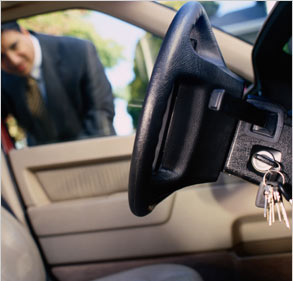WELCOME TO MERCED LOCKSMITH
You have a lot of choices when it comes to Locksmith Service in Merced. Go ahead and search online for Locksmith Merced or check the phone book under Merced Locksmith and see what you find. Most Locksmiths in Merced fall under the category of too large to care or not enough experience to make a difference. People looking for Locksmith Service in Merced are just looking for someone to trust. Who better to trust than the guy who spent his entire life right here in the Central Valley.
Robert Owsley of Owsley Lock and Key in Merced began this business nearly a decade ago. The diverse culture and unique personality of our Central Valley communities are what keep him motivated. Since then he has accumulated a wealth of information and experience that he is not afraid to share. Couple that with his competitive rates and never compromising policy on NO HIDDEN FEES, he really stands alone in Merced. Through word of mouth alone, Robert quickly became the guy to see when it comes to Merced Locksmith. At Owsley Lock and Key, we take care to provide our customers high quality services personalized for their unique needs. We are available 24 hours a day, 7 days a week. Merced Locksmith Services
|
CALL (209) 495-2314 LockoutsRe-KeyMerced Locksmith
|
Turlock Locksmith | Modesto Locksmith | Manteca Locksmith | Stockton Locksmith | Emergency Lockout | Residential | Automotive | Commercial |Contact Us
Copyright 2012 Owsley Lock and Key, 1137 Cooper Ave, Turlock, CA 95380, (209) 495-2314 | [email protected]
Copyright 2012 Owsley Lock and Key, 1137 Cooper Ave, Turlock, CA 95380, (209) 495-2314 | [email protected]
FTC CONSUMER ALERT!
Hiring a Reputable Locksmith
If you’ve ever locked yourself out of your car or home, you know what a hassle it can be. Your first thought is to get someone to help you out of your situation. If a family member or friend can’t deliver a spare set of keys, your next call might be to a local locksmith. But before you make that call, consider this: According to the Federal Trade Commission (FTC), the nation’s consumer protection agency, some locksmiths advertising in your local telephone book may not be local at all. They may not have professional training. What’s more, some of them may use intimidating tactics and overcharge you.
When “Local” Is Really Long-DistanceConsider this scenario: A company far away from your town chooses a name for its business that is very similar to the name used by a local locksmith. The company advertises in the phone book or on the Web using a local telephone number and local address. When you call the number, you’re actually connected to a call center in another city. What’s more, there’s no locksmith shop at the address listed.
You may be quoted a price on the phone, but when the locksmith arrives, often in an unmarked vehicle, he may want significantly more money. The locksmith also may accept only cash.
Some who claim to be “local locksmith” companies have multiple listings (sometimes 30 or more separate listings in a single phone book) with different names. But the calls to each of these numbers go back to the same central number in a distant city where operators dispatch untrained individuals to do the job.
Tips for Picking a LocksmithWhat’s the best way to pick a reputable locksmith? Consider researching locksmiths before you need one, the same way you would a plumber, electrician, or other professional. That works well if you’re looking to have some security work done at your home, like installing deadbolts on the exterior doors of your house, or a safe in your bedroom.
But if you’re dealing with an emergency, like being locked out of your car, you really don’t have much time for thorough research.
Regardless of whether you are locked out of your car or home, you need new locks installed, or you require other security work, the FTC offers these tips to help you hire a legitimate, local locksmith.
In emergency situations:
For More InformationIf you have a problem with a locksmith, try to resolve the dispute with the company first. Make sure you act quickly. Some companies may not accept responsibility if you fail to complain within a certain time. If you can’t get satisfaction, consider contacting your local consumer protection agency for information and assistance.
You also can file a complaint with the Federal Trade Commission. Although the FTC does not intervene in individual disputes, the information you provide may indicate a pattern of possible law violations requiring action by the Commission. The FTC works for the consumer to prevent fraudulent, deceptive and unfair business practices in the marketplace and to provide information to help consumers spot, stop, and avoid them. To file a complaint or to get free information on consumer issues, visit ftc.gov or call toll-free, 1-877-FTC-HELP (1-877-382-4357); TTY: 1-866-653-4261. The FTC enters Internet, telemarketing, identity theft, and other fraud-related complaints into Consumer Sentinel, a secure online database available to hundreds of civil and criminal law enforcement agencies in the U.S. and abroad.
The FTC works to prevent fraudulent, deceptive and unfair business practices in the marketplace and to provide information to help consumers spot, stop and avoid them. To file a complaint or get free information on consumer issues, visit ftc.gov or call toll-free, 1-877-FTC-HELP (1-877-382-4357); TTY: 1-866-653-4261. Watch a video, How to File a Complaint, at ftc.gov/video to learn more. The FTC enters consumer complaints into the Consumer Sentinel Network, a secure online database and investigative tool used by hundreds of civil and criminal law enforcement agencies in the U.S. and abroad
When “Local” Is Really Long-DistanceConsider this scenario: A company far away from your town chooses a name for its business that is very similar to the name used by a local locksmith. The company advertises in the phone book or on the Web using a local telephone number and local address. When you call the number, you’re actually connected to a call center in another city. What’s more, there’s no locksmith shop at the address listed.
You may be quoted a price on the phone, but when the locksmith arrives, often in an unmarked vehicle, he may want significantly more money. The locksmith also may accept only cash.
Some who claim to be “local locksmith” companies have multiple listings (sometimes 30 or more separate listings in a single phone book) with different names. But the calls to each of these numbers go back to the same central number in a distant city where operators dispatch untrained individuals to do the job.
Tips for Picking a LocksmithWhat’s the best way to pick a reputable locksmith? Consider researching locksmiths before you need one, the same way you would a plumber, electrician, or other professional. That works well if you’re looking to have some security work done at your home, like installing deadbolts on the exterior doors of your house, or a safe in your bedroom.
But if you’re dealing with an emergency, like being locked out of your car, you really don’t have much time for thorough research.
Regardless of whether you are locked out of your car or home, you need new locks installed, or you require other security work, the FTC offers these tips to help you hire a legitimate, local locksmith.
In emergency situations:
- If you’re locked out of your car and have a roadside assistance service, call them first. These services sometimes are included with the purchase of a car, or as an add-on through your insurance company. You also can buy this service separately. Roadside assistance plans often have a list of pre-approved companies to perform services like unlocking cars, jump-starting batteries, changing flat tires, delivering gasoline, and towing.
- Call family or friends for recommendations.
- If you find a locksmith in the phone book, on the Internet, or through directory assistance, and a business address is given, confirm that the address belongs to that locksmith. Some disreputable companies list street addresses to give the impression that they’re local. But the addresses may belong to other businesses or vacant lots, if they exist at all. You can verify addresses through websites that allow you to match phone numbers with street addresses. Some legitimate locksmith companies may not include a street address in their listing either because they operate a “mobile” business or they operate their business out of their home and may be reluctant to list that address. If you call a locksmith who doesn’t list an address, ask why. If the answer is that it's a “mobile” business, you will understand they have no storefront.
- Write down the names of several businesses, their phone numbers, and addresses for future reference, in case you don’t want to go with the first locksmith you call.
- If a company answers the phone with a generic phrase like “locksmith services,” rather than a company-specific name, be wary. Ask for the legal name of the business. If the person refuses, call another locksmith.
- Get an estimate for all work and replacement parts from the locksmith before work begins. In cases of “lock-outs” (being locked out of your car or home), most legitimate locksmiths will give you an estimate on the phone for the total cost of the work.
- Ask about additional fees before you agree to have the locksmith perform the work. Companies may charge extra for responding to a call in the middle of the night. Ask if there is a charge for mileage, or a minimum fee for a service call.
- If the price the locksmith provides when he arrives doesn’t jibe with the estimate you got on the telephone, do not allow the work to be done.
- Never sign a blank form authorizing work.
- Find out if the locksmith is insured. If your property is damaged during a repair, or if faulty work leads to loss or damage, it’s important for the locksmith to have insurance to cover your losses.
- When the locksmith arrives, ask for identification, including a business card and, where applicable, a locksmith license. Nine states require locksmiths to be licensed: Alabama, California, Illinois, Louisiana, New Jersey, North Carolina, Oklahoma, Tennessee and Texas. In addition to a business card, check to see if the invoice includes the company’s name, and whether the locksmith’s vehicle has a name that matches the business card, invoice, and/or bill.
- Expect the locksmith to ask you for identification, as well. A legitimate locksmith should confirm your identity and make sure you’re the property owner before doing any work.
- Some locksmiths will work out of a car for quick or emergency jobs, but most will arrive in a service vehicle that is clearly marked with their company’s name.
- In the case of a lock-out, be cautious if you’re told up front that the lock has to be drilled and replaced. An experienced legitimate locksmith has invested in the tools and education to provide quality service, and can unlock almost any door.
- After the work is completed, get an itemized invoice that covers parts, labor, mileage, and the price of the service call.
In situations where you have more time, check out locksmiths with your state Attorney General (www.naag.org), local consumer protection agency (www.consumeraction.gov), and the Better Business Bureau (www.bbb.org) to make sure there are no unresolved complaints on file. (You can get the phone numbers for these organizations in your phone book, through directory assistance, or through Web directories.) This is true whether you need a locksmith for a one-time job, or you want to hire someone to work for you on a continuing basis. You must be able to trust your locksmith. You don’t want to give access to the locks for your home, car, or place of business to just anyone.
For More InformationIf you have a problem with a locksmith, try to resolve the dispute with the company first. Make sure you act quickly. Some companies may not accept responsibility if you fail to complain within a certain time. If you can’t get satisfaction, consider contacting your local consumer protection agency for information and assistance.
You also can file a complaint with the Federal Trade Commission. Although the FTC does not intervene in individual disputes, the information you provide may indicate a pattern of possible law violations requiring action by the Commission. The FTC works for the consumer to prevent fraudulent, deceptive and unfair business practices in the marketplace and to provide information to help consumers spot, stop, and avoid them. To file a complaint or to get free information on consumer issues, visit ftc.gov or call toll-free, 1-877-FTC-HELP (1-877-382-4357); TTY: 1-866-653-4261. The FTC enters Internet, telemarketing, identity theft, and other fraud-related complaints into Consumer Sentinel, a secure online database available to hundreds of civil and criminal law enforcement agencies in the U.S. and abroad.
The FTC works to prevent fraudulent, deceptive and unfair business practices in the marketplace and to provide information to help consumers spot, stop and avoid them. To file a complaint or get free information on consumer issues, visit ftc.gov or call toll-free, 1-877-FTC-HELP (1-877-382-4357); TTY: 1-866-653-4261. Watch a video, How to File a Complaint, at ftc.gov/video to learn more. The FTC enters consumer complaints into the Consumer Sentinel Network, a secure online database and investigative tool used by hundreds of civil and criminal law enforcement agencies in the U.S. and abroad


